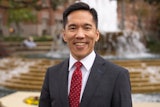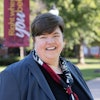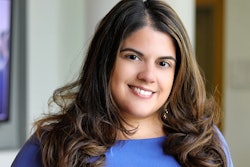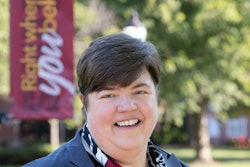Faced with a public controversy over its limited faculty diversity, Emerson College has responded with a spate of hirings and promotions of minorities, capped by the installation in July of its first African-American president, Dr. M. Lee Pelton.
Though many other higher education institutions have struggled to effect real change in response to institutional bias allegations, Emerson, a private liberal arts college in Boston, broke from that pattern, first by naming an expert panel to conduct an external review and make a public report on its findings.
The three-member panel reported in 2010 that stigma and bias had left Emerson’s Black faculty in a “caste-like position” that devalued their intellectual work and slowed their advancement. At that point, the college, founded in 1880, had tenured only three Black professors in its history — and two of them had to sue to obtain that status.
In less than two years since that critical report, Emerson has granted tenure to two other African-Americans and an Asian-American and hired or promoted a number of other minorities. A Black professor, Dr. Jerald Walker, has been promoted to an interim department chairman after only a year on the faculty.
“One would wish that more institutions, when faced with this kind of challenge, would respond as positively as Emerson has,” says Dr. Theodore Landsmark, president of Boston Architectural College, who was chairman of the external review panel. “The college has taken impressive initial steps to diversify the faculty.”
Weeks before the report was released, William Smith left Emerson in frustration after five years as executive director of its Center for Diversity. “There have been a number of people that have been hired.
There’s been some progress,” concedes Smith, executive director of the National Center for Race Amity at Wheelock College, also in Boston.
Pelton, who had been president of Willamette University in Oregon for 12 years, took over as Emerson’s president on July 1. An advocate for affirmative action in higher education, Pelton has reviewed the college’s hiring record and credits his predecessor, Dr. Jacqueline Liebergott, with making improvements in her latter years as president.
“I think there has been some notable progress in a very short time,” says Pelton. “The percentage of faculty of color has increased by about 80 percent in the last five years. That in and of itself, I think, is a remarkable improvement.”
Liebergott did not respond to an interview request made before she retired June 30 after 19 years as president.
The diversity controversy, which came to the fore at Emerson in the 1970s, flared again in 2008 with the denial of tenure to two Black professors. Both filed complaints with the Massachusetts Commission Against Discrimination, a state agency comparable to the federal Equal Employment Opportunity Commission. The Boston NAACP criticized Emerson for the tenure denials. In a conciliatory move, Emerson offered both professors a chance to reapply for tenure in 2011 if each dropped his discrimination complaint. Dr. Roger House, an associate professor of journalism, accepted the offer and did receive tenure earlier this year. He declined to comment for this article.
The other, Pierre Desir, an assistant professor of videography and cinematography, rejected the offer and left the college in 2009. He was a visiting professor at Dillard University before a period of unemployment.
In March, the Massachusetts Commission Against Discrimination found “probable cause to credit the allegations” of race and age bias made by Desir, who did not respond to interview requests. His case is in a period of mandatory conciliation with agency officials overseeing the process.
Asked how he wants Desir’s complaint to be resolved, Pelton replies: “Obviously, I can’t speak to a specific case. But I am confident that the resolution will be one that’s based on the merits of the case and that represents the best ideas of the college.”
In 2009, faculty advocates of diversity pressed for the appointment of an outside panel to review hiring and promotion practices at the college. The Massachusetts Institute of Technology, faced with a similar controversy not long before, had conducted a review internally.
Liebergott tapped Landsmark, a college president who had been a civil rights lawyer specializing in employment discrimination cases in higher education; Dr. Evelynn Hammonds, dean of Harvard College; and Dr. JoAnn Moody, a national consultant on faculty diversity. Landsmark and Hammonds are Black; Moody is White.
Before the external review was complete, Liebergott announced in late 2009 that she would retire in 2011. The executive search firm that the college retained started contacting prospective candidates. Pelton was one of them.
“Emerson sought me out,” recalls Pelton, 60, who had taken a sabbatical to contemplate his future. “It was during that period that the first of several inquiries came to me from Emerson saying they’re interested in me. Those conversations led to my coming to campus and visiting and very quickly to my appointment as president.” The selection was announced in the fall.
A Harvard-educated scholar of English and poetry, Pelton had increased faculty diversity in his dozen years at Willamette. The number of minority professors doubled from 7 percent to 14 percent on the faculty of about 300.
Before and after the Supreme Court’s 2003 decision in the University of Michigan affirmative action cases, Pelton was an outspoken advocate of affirmative action in higher education.
“I would describe myself as a leading voice on behalf of sustaining the principles of affirmative action that were established in 1978 in the Bakke case, in which Justice (Lewis) Powell described diversity as having a compelling national interest,” Pelton says. “So I wrote about that. I spoke in various settings.”
Emerson insiders dispute the assumption that Pelton was hired — with the college embroiled in the diversity controversy — because he is African-American.
“His racial identity had nothing to do with him getting the job,” declares Michael Brown, an assistant professor of journalism who, after filing a lawsuit, in 1979 became the first minority tenured at Emerson.
Colette Phillips, an Emerson graduate and member of the presidential search committee, says of Pelton: “We had some fine candidates. This guy just stood out from the get-go.”
Though Emerson made the first approach, Pelton had expressed interest in the college’s presidency before it became vacant. His daughter Clare is a senior there, and he had checked out Emerson thoroughly — as would a father who also is a college president.
“When I arrived here with my daughter some years ago, I was very impressed with Emerson College,” he says. “The facilities were, and still are, magnificent. I got a very close-up view of both the faculty and how the curriculum was organized. The students are bright and infectious and enthusiastic about just about everything.”















